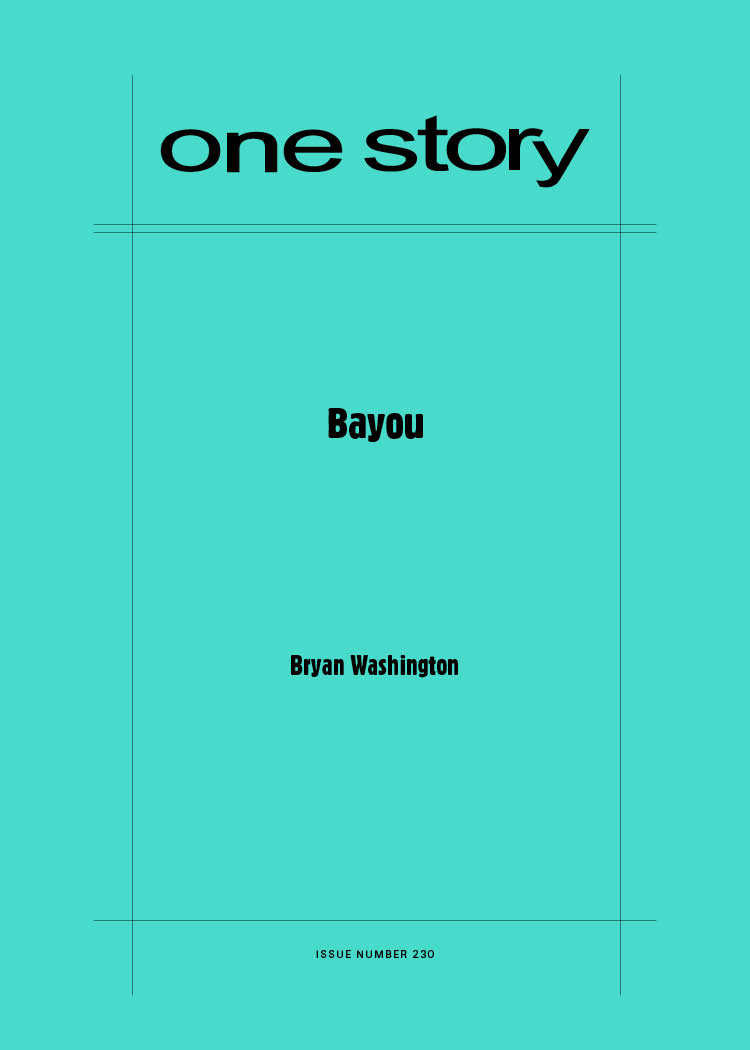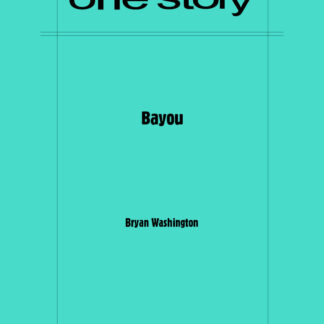
Bayou
$2.50
112 in stock
Excerpt
Mix found his chupacabra next to the bayou, under the bridge, and by the time he ran to fetch me it’d bled in the water and died.
For better or worse, this wasn’t the worst thing that’d happened. Mix and I were broke. We’d flunked out of the community college. My girl, Denise, was having someone else’s baby, and I’d been living down by Shepherd, out in the Heights, back with Gran. Her place sat behind what were basically cardboard houses, leaning against the wind like a baby’d scribbled them in, and Gran had started slipping the Navy pamphlets under my door, which Mix called unfortunate, and debilitating, but hilarious—like, picture my fat ass in somebody’s uniform, because you couldn’t even do it without the buttons pegging your nose.
That these things could keep happening and life could keep going were more mysterious to me than whatever the fuck he was showing me.
It was also hot as shit. Typical Houston.
The chupacabra was hairless and brown. Pale under the paws. I looked at the body with the gnats creeping around it, and then at Mix, and then the chupacabra again, and I thought about whether the stench was rigor mortis or just the sunburnt factories across the 10.
Bryan Washington
Bryan Washington is a writer from Houston. His first collection of stories, Lot, is forthcoming from Riverhead Books.
Patrick Ryan on “Bayou”
When I was ten years old, I saw a movie called The Mysterious Monsters. It was about Bigfoot, the Loch Ness Monster, and the Abominable Snowman, and it was filled with cheesy “reenactments” of personal testimonies about encounters with these mythical creatures. Because it was presented as a documentary, and because I was ten, I watched the reenactment footage in absolute horror, completely forgetting these were actors (including the guy in the Bigfoot costume). For the next year, I had a hard time falling asleep, convinced that Bigfoot was going to crash a hairy arm through my bedroom window. I also spotted Bigfoot any time I got near nature—at least a dozen sightings by the time I turned eleven.
The two friends in Bryan Washington’s short story “Bayou” aren’t boys; they’re young men. When they discover a strange creature near a bayou on the outskirts of Houston, it isn’t fear they feel so much as a burnt-out sense of wonder, and maybe a chance to make some money. I was immediately drawn to “Bayou” because it begins with a chupacabra, and while many people claim to have encountered chupacabras (and even filmed them), biologists refuse to confirm their existence. So I was hooked from the get-go. But what follows is more than a monster story. It’s a story about friendship, misunderstanding, and longing. Or, as the author puts it in our Q&A, it’s a story about intimacy. I hope you enjoy it as much as I did, and if it inspires your own sighting of a mysterious monster—so long as it’s not a Bigfoot—I look forward to the reenactment.
Q&A by Patrick Ryan
- PR: Where did the idea for this story come from?
- BW: I wanted a story set in the present where a strange thing happened to black and brown folks. The piece was born out of looking for that, and not finding quite finding what I wanted. There were definitely models I borrowed (or stole) from—Manuel Gonzales’s “One-Horned & Wild-Eyed,” Helen Oyeyemi’s Boy, Snow, Bird, Victor LaValle’s Big Machine, and whole chunks of Etgar Keret’s oeuvre. Each of them bends reality in a way that’s engrossing, and gripping, and not entirely implausible, while entirely concise. But read enough contemporary narratives with supposedly surreal elements, aside from the notable few, and you find that sense of wonder seems to happen to the same people over and over again. That’s starting to change but there’s a long way to go.
- PR: Have you ever encountered a chupacabra? Or do you know someone who has? Since first reading your story, I’ve found some pretty strange YouTube videos (which led me down a rabbit hole so that, twenty minutes later, I was watching videos about Bigfoot and the Loch Ness Monster). Biologists aren’t on the confirming end of the chupacabra’s existence, but plenty of non-biologists are.
- BW: Myself personally? Nah. But, as you found out, Texas is strange about these things: spend enough time in any part of the state, and you’ll run into someone who’s seen some weird shit. That same fervency also seeps into the state’s political leanings, and its less humane human rights stances, making it a dubious catalyst at best. But you won’t find anything like our allegiance to myth anywhere else in the country. It’s why I’ll always loathe Texas, and why I’ll always probably always come back.
- PR: This is a bit of spoiler, but I have to ask: How did the ending come to you? It’s such a dramatic (and surprisingly quiet) moment—one of the most memorable endings I’ve read in a long time. Did the idea for it come late for you, or was it in place all along?
- BW: Honestly, the story took about two years to finish, and I had no idea how it would end until I finally got there. The whole thing felt so absurd conceptually that a conclusion felt over my head. So I was mostly just floating across the pages, and, at first, the ending seemed preposterous. It’s too quiet. No revolt, no alien takeover. But it immediately became clear that this was the only way it could’ve ended. I think a lot of the things that really change us happen with a whisper. And I’m into the contrast of an entirely bombastic circumstance ending without an explosion.
- PR: Mix and TeDarus have a wonderful dynamic that is quite often comic. How does humor find its way into your work? Intentionally or accidentally?
- BW: I’m glad the humor hits—it’s a counterbalance to despair. I think their situation needed something to balance it out. They live in an unresourced part of Houston. They have no prospects to speak of. Everything they grasp for seems to dissolve, and those jokes are a way of coping, or of recalibrating the world so that it’s bearable. Some folks do that with religion. Others take solace under the rule of law. Maybe I’m bugging, but for me, TeDarus and Mix’s journey is largely about navigating a certain kind of malaise.
- PR: Finish this sentence in just one word—the word you think best captures it: “This story is about __________.”?
- BW: Intimacy. (A friend told me that, in my stories, everyone’s falling in love with the wrong person. TeDarus is—begrudgingly, flailingly—in love with just about everyone. Mix is—begrudgingly, flailingly—in love with TeDarus. The chupacabra’s left alone, its family or whatever has left it behind, and these two guys are the only ones around to take it in. So the question I’m always interested in exploring is, What do we make of the people we’re surrounded with? Who do we allow to love us? Even if they weren’t who we’d envisioned in a thousand years? And how does that alter what we allow love to be?)
- PR: What are you working on now?
- BW: I’m editing the collection of stories that “Bayou” appears in (the book’s called Lot, Riverhead is releasing it in 2019). And I’m trying to figure out another long work of fiction. We’ll see how that works out.
- PR: What have you been reading lately?
- BW: Despite our Akira-esque political climate, this is one of those years where every book on the shelf’s been gold: Shanthi Sekaran’s Lucky Boy, Lisa Ko’s The Leavers, Amelia Gray’s Isadora, and Mark Haber’s Melville’s Beard knocked me out. I’m stoked for Alexia Arthurs’s How to Love a Jamaican and Daniel Peña’s Bang. Sherman Alexie’s memoir damn near cracked me open, and Gabe Habash’s Stephen Florida is so sharp that it’s hardly believable.
- PR: What is the best bit of advice about writing you have ever received?
- BW: One time my friend Mat said to do the difficult thing. That keeps me up at night.
